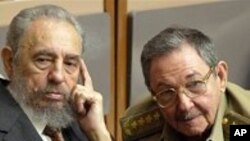<!-- IMAGE -->
Change comes slowly in Cuba,
even when it starts at the top. Despite expectations of reforms when Raul
Castro became president last year and some signs of easing, the island nation
remains a tightly controlled central economy under a Communist regime that suppresses
freedom of speech and other civil liberties.
The Castro government has extended its authority over the Internet, as it has
done with newspapers, radio and television. It restricts access to computers
and Internet subscriptions, keeping prices high and blocking Web sites that the
government considers critical or undesirable. Officials and government
loyalists monitor Web logs, or blogs, to watch for signs of dissent and to post
comments supporting the regime and attacking its critics.
These actions took an ugly turn this month when three prominent Cuban Internet
journalists were attacked by plain clothes government security agents. On their
way to cover a peaceful march in downtown Havana, Yoani Sanchez, Orlando Luis
Pardo and Claudia Cadelo were forced into unmarked cars and driven around for
twenty minutes, during which time Ms. Sanchez was beaten. Ironically, the
purpose of the march, organized by young musicians, was to protest against
violence. Ms. Sanchez's work reporting on conditions in Cuba has been
recognized around the world.
President Barack Obama proclaimed November 9 as World Freedom Day, and it is
just this kind of repression and violence against the voices of freedom and
reconciliation that his proclamation is meant to expose.
The United States strongly deplores the assault and urges the government of
Cuba to ensure the full respect of the human rights and fundamental freedoms of
all its citizens.





